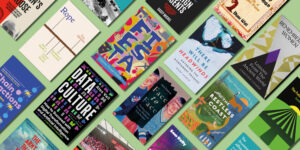
The long-awaited summer is here at last with that tell-tale June weather. Whether you’re a jet-setter or a home bird, make this summer the one where you lose yourself in a different world or learn about a fascinating topic with your latest gripping non-fiction read. This summer, we’re bringing the perfect companions to hectic holidays and lazy lie-ins with our new titles and upcoming paperbacks.
With everything from quirky travelogues to unknown histories, make sure you follow the links of the titles that spark your curiosity and follow us on X and Instagram @iconbooks to share what you’re reading this summer!
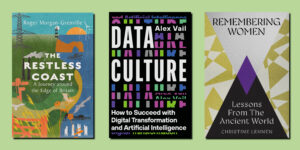
WHAT’S NEW THIS JUNE
The Restless Coast: A Journey around the Edge of Britain by Roger Morgan-Grenville (5th June 2025)
The island of Britain has over 10,000 miles of coastline, steeped in history and constantly shifting, changing, adapting and providing. The Restless Coast is a moving and beautiful account of a journey around it, during which the author sets out to discover its challenges and opportunities, and to talk to its people.
At once delightful travelogue and passionate defence, The Restless Coast shines a powerful spotlight on the thin line that surrounds us, and defines our status as islanders. Overarching the journey is the extraordinary natural history of the coastline, together with the story of how man has imprinted himself on its very geology and shape for countless centuries. Roger Morgan-Grenville addresses the modern challenges that the shoreline faces, and highlights the people who are trying to protect it.
Informative, angry and funny, The Restless Coast is a very personal love letter to our island edge.
More information: https://uk.bookshop.org/p/books/the-restless-coast-a-journey-around-the-edge-of-britain-roger-morgan-grenville/7891588?ean=9781837731442
Data Culture: How to Succeed with Digital Transformation and Artificial Intelligence by Alex Vail (5th June 2025)
Capturing the views of over 300 business leaders on the common causes of digital transformation failure, this book sets out an actionable framework to help organisations of all sizes build successful data-driven cultures.
After working as a senior executive in one of the country’s leading manufacturers, Alex Vail took a sabbatical to conduct several research projects, including the largest ever study into the UK’s corporate AI capabilities. In total, he surveyed 234 senior leaders and interviewed 92 executives from FTSE350 companies to identify why digital transformations succeed or fail; the data dependency of organisations; and their levels of data literacy at senior levels. What emerged from the research was a clear set of success factors, grounded in mindset and behaviour elements, which have been used to create a framework that any company can follow, regardless of their size or complexity, that will guarantee successful data transformations.
More information: https://uk.bookshop.org/p/books/data-culture-how-to-succeed-with-digital-transformation-and-artificial-intelligence-alex-vail/7891589?ean=9781837732319
Remembering Women: Lessons from the Ancient World by Christine Lehnen (19th June 2025)
Women do have a history of their own.
All we need to do is remember it.
In this illuminating new investigation, Christine Lehnen looks back at our collective memory to explore the myriad ways that women in the past have enjoyed a more egalitarian life.
Due to advances in bioarchaeological methods, scientists have discovered that one out of three women in Ancient Scythia was an active warrior buried with her weapons. Far from being confined to their homes, these women rode out to hunt, travelled to distance places, or used weapons to fend off their enemies. These warriors were no exceptions to the rule, with women enjoying a significantly higher degree of equality than their Greek contemporaries.
Remembering Women argues that there is a historical precedent for a fairer society. From reappraisals of well-known objects such as the earliest human bone calendars from the Stone Age to revelatory findings of innovative bioarcheological methods used on human remains from Ancient Scythia, evidence is accumulating that there were places in the past where all women were allowed to thrive.
Interweaving new findings from archaeology with the stories of her mother and grandmothers, as well as her everyday experiences as a woman living today, Lehnen explores our collective memory of women and argues that it needs to change if we are to create an egalitarian society. Remembering Women follows the traces left in the material, literary, and archaeological record by our foremothers, and their heirlooms, artwork and stories, to take a fresh look at our life in the present.
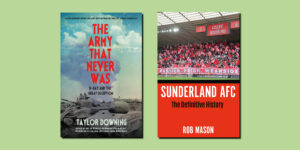
COMING IN PAPERBACK IN JUNE 2025
The Army That Never Was: D-Day and the Great Deception by Taylor Downing (5th June 2025)
The Army That Never Was: D-Day and the Great Deception tells the remarkable story of the deceptions, hoaxes and misdirections carried out by the Allies ahead of the most pivotal moment of the Second World War – the D-Day invasion.
The most audacious of these schemes aimed to convince German forces that plans to storm Normandy were a mere sideshow, and featured a fictitious army led by General Patton and furnished with hundreds of real-world dummy landing craft, tanks and aircraft. New research reveals a hidden link with Britain’s film industry, as the fascinating behind-the-scenes story of this dramatic gambit is explored in detail.
Full of fascinating characters from the US, Britain and Germany, this compelling and propulsive narrative explores one of the most remarkable secret campaigns of the Second World War.
Sunderland AFC: The Definitive History by Rob Mason (19th June 2025)
The definitive history of Sunderland AFC.
Formed by a group of teachers nearly 150 years ago in 1879, Sunderland AFC have a long and storied history in English football. The club has won six top-flight titles, only six other teams have won more, and they have lifted the FA Cup twice – in 1937 and in 1973.
The Black Cats are renowned for having one of the largest and most loyal fan bases in the country, and records have regularly been broken for attendance figures at the Stadium of Light. After hitting a nadir with back-to-back relegations from the Premier League down to the third division in 2018, the club are now back on the ascendancy and plotting a return to the top flight.
Drawing on interviews with key players, managers and staff members, esteemed club historian Rob Mason delves into Sunderland’s 150-year history, charting the glorious highs and the ignominious lows to trace how the Black Cats have come to dominate football in the North-East.
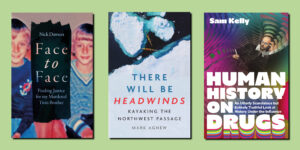
WHAT’S NEW THIS JULY
Face to Face: Finding Justice for My Murdered Twin Brother by Nick Dawson (3rd July 2025)
When his identical twin brother Simon was kicked to death, all Nick Dawson felt for the killers was hatred.
Struggling in a world where his mirror image had vanished, he came to realise there was only one way to stop the torture – acceptance. Travelling to the absolute limits of personal darkness, Nick came face to face with one of his brother’s killers.
Now a champion of restorative justice, Nick heads behind bars, asking hardened criminals to change, to think of their victims, to make amends.
In Face to Face he takes us with him on a journey into this hidden and unpredictable world.
More information: https://uk.bookshop.org/p/books/face-to-face-finding-justice-for-my-murdered-twin-brother-nick-dawson/7831503?ean=9781837732425
There Will Be Headwinds: Kayaking the Northwest Passage by Mark Agnew (3rd July 2025)
Mark Agnew was part of the first team ever to kayak the northwest passage – spending 103 days in the Arctic.
The infamous route between the Atlantic and Pacific oceans had defeated countless explorers for centuries, and Mark himself had failed on two previous expeditions to row across the Atlantic. Pushed to the brink, on the verge of turning his back on the adventures that had made him feel alive, he experienced a mental health crisis and almost abandoned the water forever.
Charting an inspirational journey from failure to world record breaker, in There Will Be Headwinds Mark reflects on his struggles and reveals the lessons from sports psychology that allowed him to conquer his demons and achieve something truly remarkable. An astonishing story of ice, suffering and camaraderie, There Will Be Headwinds is a testament to the power of teamwork, determination and ambition – and a celebration of the human spirit of adventure.
More information: https://uk.bookshop.org/p/books/there-will-be-headwinds-kayaking-the-northwest-passage-mark-agnew/7831502?ean=9781837732142
Human History on Drugs: An Utterly Scandalous but Entirely Truthful Look at History Under the Influence by Sam Kelly (17th July 2025)
A lively, hilarious, and entirely truthful look at the druggie side of history’s most famous figures, including Shakespeare, Queen Victoria, and the Beatles, from debut author (and viral historical TikToker with over 100K followers) Sam Kelly.
Did you know that Alexander the Great was a sloppy drunk, William Shakespeare was a stoner, and George Washington drank a spoonful of opium every night to staunch the pain from his fake teeth? Or how about the fact that China’s first emperor, Qin Shi Huangdi, ingested liquid mercury in an (ironic) attempt to live forever, or that Alexander Shulgin, inventor of no fewer than 230 new psychedelic drugs, was an employee of the DEA?
In Human History on Drugs, historian Sam Kelly introduces us to the history we weren’t taught in school, offering up irreverent and hysterical commentary as he sheds light on some truly shocking aspects of the historical characters we only thought we knew. With chapters spanning from Ancient Greece (‘The Oracle of Delphi Was Huffing Fumes’) and the Victorian Era (‘Vincent van Gogh Ate Yellow Paint’) to Hollywood’s Golden Age (‘Judy Garland Was Drugged by Grown-Ups’) and modern times (‘Carl Sagan Got Astronomically High’), Kelly’s research spans all manner of eras, places, and, of course, drugs.
History is rife with drug use and drug users, and Human History on Drugs takes us through those highs (pun intended) and lows on a wittily entertaining ride that uncovers their seriously unexpected impact on our past.
More information: https://uk.bookshop.org/p/books/human-history-on-drugs-an-utterly-scandalous-but-entirely-truthful-look-at-history-under-the-influence-sam-kelly/7831505?ean=9781837733095
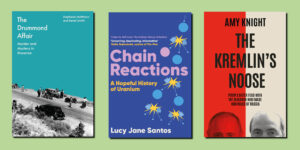
COMING IN PAPERBACK IN JULY 2025
The Drummond Affair: Murder and Mystery in Provence by Stephanie Matthews and Daniel Smith (3rd July 2025)
1950s France. A British establishment figure. A shocking crime. A miscarriage of justice. The search for truth.
In 1952, in a peaceful corner of Provence, a farmer’s son stumbled upon a terrible scene. Three bodies: a husband and wife shot dead, their ten-year-old daughter savagely beaten to death. They were all British. So begins one of the most notorious murder cases in French history.
Sir Jack Drummond was a senior advisor to the British government, a household name who was respected and admired. His fame made the case a cause célèbre in France and resulted in the swift conviction of a local farmer, but questions about Drummond’s life and death remain unanswered.
In this bold new investigation, Stephanie Matthews and Daniel Smith strip away the prejudice and propaganda to reveal a grave miscarriage of justice. A light is shone on Drummond’s secret life in the shadows of the Cold War, painting a portrait of an enigmatic man who may not have been the innocent holidaymaker he appeared to be, and recasting one of the twentieth century’s most notorious murders in a fascinating and important new light.
More information: https://uk.bookshop.org/p/books/the-drummond-affair-murder-and-mystery-in-provence-stephanie-matthews/7639342?ean=9781837730599
Chain Reactions: A Hopeful History of Uranium by Lucy Jane Santos (31st July 2025)
Tracing uranium’s past, and how it intersects with our understanding of other radioactive elements, this book aims to disentangle our attitudes and to unpick the atomic mindset.
Chain Reactions looks at the fascinating, often-forgotten, stories that can be found throughout the history of the element. Ranging from glassworks to penny stocks; medicines to weapons; something to be feared to a powerful source of energy, this global history not only explores the development of our scientific understanding of uranium, but also shines a light on its cultural and social impact.
By understanding our nuclear past, we can move beyond the ideological opposition to atomic technology and encourage a more nuanced dialogue about whether it is feasible – and desirable – to have a genuinely nuclear-powered future.
More information: https://uk.bookshop.org/p/books/chain-reactions-a-hopeful-history-of-uranium-lucy-jane-santos/7650570?ean=9781837731992
The Kremlin’s Noose: Vladimir Putin’s Bitter Feud with the Oligarch Who Made Him Ruler of Russia by Amy Knight (31st July 2025)
A Guardian Book of the Day
In The Kremlin’s Noose Amy Knight tells the riveting story of Vladimir Putin and the oligarch Boris Berezovsky, who forged a relationship in the early years of the Yeltsin era.
Berezovsky later played a crucial role in Putin’s rise to the Russian presidency in March 2000. When Putin began dismantling Boris Yeltsin’s democratic reforms, Berezovsky came into conflict with the new Russian leader by reproaching him publicly. Their relationship quickly disintegrated into a bitter feud played out against the backdrop of billion-dollar financial deals, Kremlin in-fighting and international politics.
Dubbed the ‘Godfather of the Kremlin’ by the slain Russian-American journalist Paul Klebnikov, Berezovsky was a successful businessman and media mogul who had an outsized role in Russia after 1991. Worth a reported $3 billion by 1997, Berezovsky engineered the re-election of Yeltsin as president in 1996 and negotiated an end to the 1995-96 Chechen war. Despite his own wealth, power and influence, once he became Putin’s enemy, Berezovsky was forced into exile in Britain, where he waged a determined campaign to topple Putin. Kremlin authorities responded with bogus criminal charges and demanded Berezovsky’s extradition. Death threats soon followed. In March 2013, after losing a British court battle with another Russian oligarch, Berezovsky was found dead at his ex-wife’s mansion outside London. Whether he died from suicide or murder remains a mystery.
The Kremlin’s Noose sheds crucial new light on the Kremlin’s volatile politics under Yeltsin and Putin, helping us understand why democracy in Russia failed so badly. Knight provides a fascinating narrative of Putin’s rise to power and his authoritarian rule, told through the prism of his relationship with Russia’s once most powerful oligarch, Boris Berezovsky.
More information: https://uk.bookshop.org/p/books/the-kremlin-s-noose-vladimir-putin-s-bitter-feud-with-the-oligarch-who-made-him-ruler-of-russia-amy-knight/7831504?ean=9781837732210
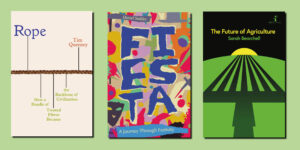
WHAT’S NEW THIS AUGUST
Rope: How a Bundle of Twisted Fibres Became the Backbone of Civilization by Tim Queeney (14th August 2025)
A unique and compelling adventure through the history of rope and its impact on civilization, in the vein of single-subject bestsellers like Salt and Cod.
Tim Queeney is a sailor who knows more about rope and its importance to humankind than most. In Rope, Queeney takes readers on a ride through the history of rope and the way it weaves itself through the story of civilization. From Magellan’s world-circling ships, to the 15th-century fleet of Admiral Zheng He, to Polynesian multihulls with crab claw sails, he shows how without rope, none of their adventurous voyages and discoveries would have been possible. Time travelling, he describes the building of the pyramids, the Roman Colosseum, Hagia Sophia, Notre-Dame, the Sultan Hasan Mosque, the Brooklyn Bridge, and countless other constructions that would not have been possible without rope.
Not content to just look at rope’s past, Queeney examines its present and possible future and how the re-invention of rope with synthetic fibers will likely provide the strength for cables to support elevators into space. Drawing upon personal experience, Queeney tells remarkable nautical stories of his own reliance on rope at sea. Rope is history, adventure, and the story of one of the world’s most common tools that has made it possible for humans to advance throughout the centuries.
More information: https://uk.bookshop.org/p/books/rope-how-a-bundle-of-twisted-fibres-became-the-backbone-of-civilization-tim-queeney/7843984?ean=9781837733316
Fiesta: A Journey Through Festivity by Daniel Stables (14th August 2025)
A journey through human festivity, told through colourful travel narratives set at some of the world’s most eye-catching festivals and interweaved with insights from the fields of anthropology, history, psychology, and folklore, examining why we celebrate festivals in the ways we do.
Fiesta explores the vibrant tapestry of human festivity, delving into the extraordinary lengths to which we go to express our cultures and commemorate life’s milestones. From drunken pilgrimages to sacrificial funerals, national days to neo-pagan necromancy, festivals represent human culture at its most vivid and varied, and the resulting account is both a rich collection of travel writing and an anthropological exploration of the roles that festivals play in society. Through colourful characters, vibrant sights, and varied locales, Daniel Stables takes a curious, humanistic look at festivals across the world, unravelling the universal threads that run through our diverse global celebrations.
More information: https://uk.bookshop.org/p/books/fiesta-a-journey-through-festivity-daniel-stables/7843983?ean=9781837732517
The Future of Agriculture by Sarah Bearchell (28th August 2025)
Record rain fall and extreme climates have become a common occurrence around the world. The television news shows farmers standing in front of their flooded fields; the ground too wet to harvest one season’s crop, or to plant the next. Our climate is changing, but agriculture is not just the victim of climate change – it is one of the major drivers too. Our food systems are responsible for around a third of all greenhouse gases.
In this book, Sarah Bearchell explores how agriculture is using targeted breeding, automation and precision inputs to produce more with less. She considers how we can reduce our impact by addressing problems in our food system, from packaging and transport to the incredible quantities of waste. As consumers, we can make small changes straight away and push for long-term change in the wider system. Agriculture can become a force for good, but it needs our help.
More information: https://uk.bookshop.org/p/books/the-future-of-agriculture-sarah-bearchell/7843981?ean=9781837731756
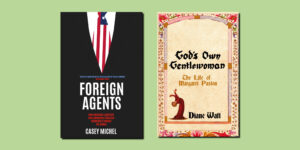
COMING IN PAPERBACK IN AUGUST 2025
Foreign Agents: How American Lobbyists and Lawmakers Threaten Democracy Around the World by Casey Michel (28th August 2025)
Foreign Policy, Most Anticipated Books of 2024
A stunning investigation and indictment of the elements in United States’ foreign lobbying industry and the threat they pose to democracy.
For years, one group of Americans has worked as foot-soldiers for the most authoritarian regimes around the planet. In the process, they’ve not only entrenched dictatorships and spread kleptocratic networks, but they’ve secretly guided U.S. policy without the rest of America even being aware. And now, journalist Casey Michel contends some of them have begun turning their sights on American democracy itself.
These Americans are known as foreign lobbyists, and many of them spent years ushering dictatorships directly into the halls of Washington, all while laundering the reputations of the most heinous, repressive regimes in the process. These lobbyists include figures like Ivy Lee, the inventor of the public relations industry – a man who whitewashed Mussolini, opened doors to the Soviets, and advised the Nazis on how to sway American audiences. They include people like Paul Manafort, who invented lobbying as we know it – and who then took his talents to autocrats from Ukraine to the Philippines, and then back to the White House. And they now include an increasing number of Americans elsewhere: in law firms and consultancies, among PR specialists and former lawmakers, and even within think tanks and universities.
Many of these lobbyists have transformed into proxies for dictators and strongmen wherever they can be found. And for years, they’ve escaped scrutiny.
In Foreign Agents, Casey Michel shines a light on these foreign lobbyists, and all the damage and devastation they have caused in Washington and elsewhere. From Moscow to Beijing, from far-right nationalists to far-left communists, from anti-American autocrats to pro-Western authoritarians, these foreign lobbyists have helped any illiberal, anti-democratic government they can find. And after decades of success in installing dictator after dictator, and in tilting American policy in the process, some of these lobbyists have now begun trying to end America’s democratic experiment, once and for all.
More information: https://uk.bookshop.org/p/books/foreign-agents-how-american-lobbyists-and-lawmakers-threaten-democracy-around-the-world-casey-michel/7669420?ean=9781837731886
God’s Own Gentlewoman: The Life of Margaret Paston by Diane Watt (28th August 2025)
The remarkable story of Margaret Paston, whose letters form the most extensive collection of personal writings by a medieval English woman.
Drawing on the largest archive of medieval correspondence relating to a single family in the UK, God’s Own Gentlewoman explores what everyday life was like during the turbulent decades at the height of the Wars of the Roses. Covering topics including political conflicts and familial in-fighting, forbidden love affairs and clandestine marriages, bloody battles and sieges, fear of plague and sudden death, friendships and animosity, and childbirth and child mortality, Margaret’s letters provide us with unparalleled insight into all aspects of life in late medieval England.
Diane Watt, a world expert on medieval women’s writing, offers insight into Margaret’s activities, experiences, emotions and relationships, presenting the life of a medieval woman who was at times absorbed by the mundane and domestic, but who found herself caught up in the most extraordinary situations and events.
More information: https://uk.bookshop.org/p/books/god-s-own-gentlewoman-the-life-of-margaret-paston-diane-watt/7669421?ean=9781837731657
![]()
